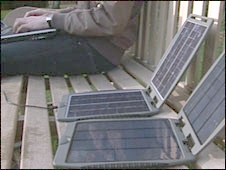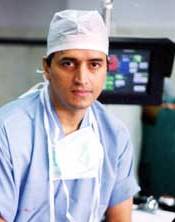Archive for November 22nd, 2009

Solar power technology takes its next step
 (BBC): The technology behind solar energy is constantly evolving. Portable devices that charge up gadgets from the sun are becoming smaller and more powerful. A new generation of portable solar chargers can plug straight into a laptop and provide up to a quarter of its power needs while in use. The Solargorilla charger by Powertraveller, for instance, can also level out the electrical spikes caused when clouds obscure the sun.
(BBC): The technology behind solar energy is constantly evolving. Portable devices that charge up gadgets from the sun are becoming smaller and more powerful. A new generation of portable solar chargers can plug straight into a laptop and provide up to a quarter of its power needs while in use. The Solargorilla charger by Powertraveller, for instance, can also level out the electrical spikes caused when clouds obscure the sun.

Hospital will have 2,000 beds
 (CNS): The true size of the proposed medical project by Dr Devi Shetty’s organisation, the Narayana Hrudayalaya Group, has been revealed this weekend in the Wall Street Journal, following the reported signing of an agreement by Dr Devi Shetty to build a 2,000 bed hospital in the Cayman Islands. Dr Shetty’s spokesperson in Cayman also confirmed that the world famous heart surgeon would soon be coming to Cayman with his revolutionary low cost health system. Although the on-island location has not yet been revealed, the new medical facility is expected to be one of the largest single developments ever in Cayman funded by the private sector.
(CNS): The true size of the proposed medical project by Dr Devi Shetty’s organisation, the Narayana Hrudayalaya Group, has been revealed this weekend in the Wall Street Journal, following the reported signing of an agreement by Dr Devi Shetty to build a 2,000 bed hospital in the Cayman Islands. Dr Shetty’s spokesperson in Cayman also confirmed that the world famous heart surgeon would soon be coming to Cayman with his revolutionary low cost health system. Although the on-island location has not yet been revealed, the new medical facility is expected to be one of the largest single developments ever in Cayman funded by the private sector.
In an interview with the WSJ, Dr Shetty says the hospital in the Cayman Islands would primarily serve Americans in search of lower-cost medical care. The plan, he says, is to build and run a 2,000-bed general hospital where procedures, both elective and necessary, will be priced at least 50% lower than what they cost in the US, which Dr Shetty hopes will draw Americanswho are either uninsured or need surgery that their plans don’t cover.
The doctor’s model offers insights for countries worldwide that are struggling with soaring medical costs, the WJS reports, including the US as it debates major health-care overhaul. "Japanese companies reinvented the process of making cars. That’s what we’re doing in health care," Dr Shetty says. "What health care needs is process innovation, not product innovation."
David Legge, who is the Cayman Islands spokesperson for Dr Shetty, also stated that the facility will offer low cost health care to Caymanians as well. The full details of the project will be revealed over the next few weeks, Legge says, and he confirmed that one of the local partners involved is Gene Thompson. “This is an incredibly exciting project and an extremely positive development for the islands in many ways,” Legge said.
The construction of the hospital when it starts would obviously provide a considerable number of new jobs on the island, and once the project is up and running, not only will it offer affordable health care to locals, it is expected to attract considerable numbers of visitors looking for the diverse range of health services that the facility will offer.
“Medical tourism is one of the fastest growing ‘new industries’ in the world and countries are embracing it to improve healthcare for their citizens, lower local costs for major surgeries and procedures, and re-energize their economies,” Legge added. “Cayman, givenits proximity to the US, appears especially well-suited to bring medical professionals, patients, and infrastructure to its shores.”
Dr Shetty, who was Mother Teresa’s personal heart physician, says he wants to make Cayman a centre of excellence in healthcare. At his flagship 1,000-bed Narayana Hrudayalaya Hospital, surgeons operate at a capacity virtually unheard of in the US, where the average hospital has 160 beds, according to the American Hospital Association.
Narayana’s 42 cardiac surgeons performed 3,174 cardiac bypass surgeries in 2008, more than double the 1,367 the Cleveland Clinic, a US leader, did in the same year. His surgeons operated on 2,777 paediatric patients, more than double the 1,026 surgeries performed at Children’s Hospital Boston.
Some have questioned whether Dr. Shetty is taking his high volume model too far, risking quality, but Jack Lewin, chief executive of the American College of Cardiology, who visited Dr Shetty’s hospital earlier this year as a guest lecturer, says he has used high volumes to improve quality. For one thing, some studies show quality rises at hospitals that perform more surgeries for the simple reason that doctors are getting more experience. And at Narayana, says Dr Lewin, the large number of patients allows individual doctors to focus on one or two specific types of cardiac surgeries.
Narayana surgeon Colin John, for example, has performed nearly 4,000 complex paediatric procedures known as Tetralogy of Fallot in his 30-year career. The procedure repairs four different heart abnormalities at once. Many surgeons in other countries would never reach that number of any type of cardiac surgery in their lifetimes.
Dr Shetty’s success rates appear to be as good as those of many hospitals abroad. Narayana Hrudayalaya reports a 1.4% mortality rate within 30 days of coronary artery bypass graft surgery, one of the most common procedures, compared with an average of 1.9% in the US in 2008, according todata gathered by the Chicago-based Society of Thoracic Surgeons.